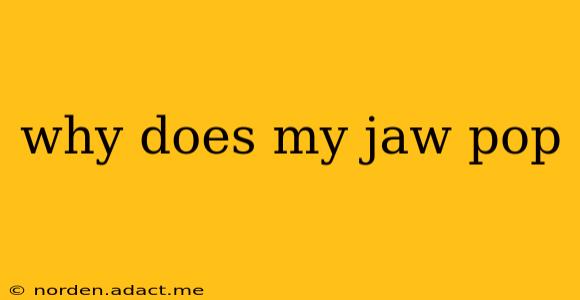Experiencing a popping jaw can be unsettling, but it's a surprisingly common issue. The culprit is often your temporomandibular joint (TMJ), the hinge connecting your jawbone to your skull. This complex joint allows for the wide range of movements your jaw performs – chewing, talking, yawning – and when something goes amiss, the resulting popping, clicking, or grinding can be quite noticeable. Let's delve into the reasons behind this clicking jaw and explore potential solutions.
What Causes a Popping Jaw?
The most frequent cause of a popping jaw is a temporomandibular joint disorder (TMJ disorder or TMD). TMD encompasses a range of conditions affecting the TMJ and the surrounding muscles and ligaments. Several factors contribute to the development of TMD, leading to that characteristic popping sound:
-
Disc Displacement: The TMJ contains a disc that acts as a cushion between the jawbone and the skull. When this disc is displaced or misaligned, it can cause a popping or clicking sound as the jaw moves. This displacement can be anterior (forward), posterior (backward), or lateral (to the side). Sometimes the disc can even become trapped, resulting in a locked jaw.
-
Ligament Laxity: The ligaments supporting the TMJ can become stretched or loosened over time, potentially leading to instability and the characteristic popping sounds. This is often associated with arthritis or repetitive jaw movements.
-
Arthritis: Just like other joints in the body, the TMJ can be affected by arthritis, causing inflammation, pain, and popping or clicking sounds. Osteoarthritis and rheumatoid arthritis are the most common types that impact the TMJ.
-
Muscle Spasms: Overuse or stress can lead to spasms in the muscles surrounding the TMJ. These spasms can put extra pressure on the joint, resulting in popping and pain. Bruxism (teeth grinding) is a significant contributor to muscle spasms.
-
Trauma: A blow to the jaw or a severe injury to the face can damage the TMJ and surrounding structures, leading to popping and other problems.
Why Does My Jaw Pop When I Open My Mouth Wide?
This is often indicative of disc displacement. As you open your mouth widely, the disc may slip out of its normal position, creating the popping sound. This is often accompanied by a feeling of the jaw getting "stuck" or "catching" during movement.
Does a Popping Jaw Always Indicate a Problem?
While a popping jaw often signals a TMJ disorder, not every pop is cause for alarm. Occasional popping sounds without pain or other symptoms might be benign. However, persistent or worsening popping, accompanied by pain, clicking, limited jaw movement, or headaches, requires professional evaluation.
How is a Popping Jaw Diagnosed?
A dentist or oral surgeon specializing in TMJ disorders can diagnose the underlying cause. The diagnosis usually involves:
- Physical Examination: Checking for range of motion, pain, and tenderness in the jaw and surrounding muscles.
- Imaging Tests: X-rays, MRI, or CT scans can help visualize the TMJ and identify any structural problems.
What are the Treatment Options for a Popping Jaw?
Treatment depends on the severity and underlying cause:
- Conservative Management: This includes lifestyle modifications (e.g., improving posture, stress management), pain relievers, and physical therapy exercises to strengthen the jaw muscles and improve joint mobility.
- Splints or Mouthguards: Custom-made appliances worn at night can help relax the jaw muscles and reposition the disc.
- Medications: Pain relievers, muscle relaxants, and anti-inflammatory drugs may be prescribed to manage pain and inflammation.
- Surgery: In severe cases, surgery might be necessary to repair the joint or correct significant structural problems.
Can I Prevent a Popping Jaw?
While not all cases are preventable, certain measures can minimize the risk:
- Stress Management: Practice relaxation techniques to reduce muscle tension.
- Maintain Proper Posture: Good posture takes pressure off the jaw.
- Avoid Jaw-Jarring Activities: Limit excessive chewing (e.g., chewing gum excessively) and repetitive jaw movements.
- Treat Bruxism: If you grind your teeth, a mouthguard can help protect your TMJ.
Disclaimer: This information is for educational purposes only and should not be considered medical advice. If you're experiencing a popping jaw or any related symptoms, consult a dentist or oral surgeon specializing in TMJ disorders for proper diagnosis and treatment. They can accurately assess your specific situation and recommend the most appropriate course of action.
